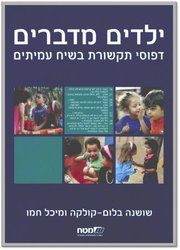
Blum-Kulka, S., & Hamo, M. (2010). Kids talk: Peer talk patterns of communication. Tel-Aviv: The Center for Educational Technology. [in Hebrew]
Cekaita, A., Aukrust, V., Blum-Kulka, S., & Teubal, E. (Eds.), (in press), Children’s peer talk and peer learning in first and second language. Cambridge: Cambridge University Press.
Blum-Kulka, S & Hamo, M. (forthcoming). Child peer talk. Oxford: Oxford University Press.
Special issues:
Blum-Kulka. S, & Weizman, E. (Eds.) (2002). Children’s conversation: Discursive literacy in genres of spoken discourse. Special issue of script, 3-4. [in Hebrew]
Blum-Kulka, S, & Snow, C. (Eds) (2004). The contribution of peer talk to pragmatic development [Special issue]. Special issue of Discourse studies, 6(3), 292-306.
Blum-Kulka, S. (2002). Introduction: Genres of spoken discourse: developmental and cross-cultural perspectives. Script 3-4, 9-25 [in Hebrew].
Blum-Kulka, S., Habib, Y., Avni, A., & Zimmerman, H. (2002)."Whose mother are you?" Experiencing ethnography of child discourse. Script 3-4: 55-75 [in Hebrew].
Blum-Kulka, S., & Huck-Taglicht D. (2002). The contribution of peer-interaction to the development of literate discourse: genres and keyings. Script 3-4, 75-110. [in Hebrew]
Blum-Kulka, S. (2004). The role of peer interaction in later pragmatic development: The case of speech representation. In R. A. Berman (Ed.) Language development across childhood and adolescence: Psycholinguistic and crosslinguistic perspectives (pp. 191-211). Amsterdam: John Benjamins.
Blum-Kulka, S., Huck-Taglicht, D., & Avni, H. (2004). The social and discursive spectrum of peer talk. Discourse studies: Peer talk and pragmatic development, 6(3), 307-328.
Blum-Kulka, S. & Snow, C. E. (2004). The potential of peer talk. Discourse studies: Peer talk and pragmatic development, 6(3), 291-307.
Hamo, M., Blum-Kulka, S., & Hacohen, G. (2004). From observation to transcription and back: Theory, practice and interpretation in the analysis of children’s naturally occurring discourse. Research in Language and Social Interaction, 37(1), 71-92.
Blum-Kulka, S. (2005). Rethinking genre: communicative genres as social interactive phenomenon. In B. Sanders & K. Fitch (Eds.). Handbook of language and social interaction (pp. 275-231). Lawrence Erlbaum.
Blum-Kulka,S. (2005). Modes of meaning making in young children's conversational storytelling. In J. Thornborrow & J. Coates (Eds.). The sociolinguistics of narrative (pp.149-171). Amsterdam: John Benjamins.
Blum-Kulka, S. (2005)."I will tell you the whole true story now": Sequencing the past, present and future in children’s conversational narratives. In D. Ravid, & H. Bat-Zeev Shyldkrot (Eds.). Perspectives on language and language development: essays in honor of Ruth. A. Berman (pp.275-289). Dodrecht, the Netherlands: Kluwer. (Also available in Hebrew; for details see publications in Hebrew).
Kampf, Z., Huck-Taglicht, D.,& Blum Kulka, S. (2006). Children telling television: The contribution of television-based pretend plays to literacy development. Panim, 37, 38-47. [In Hebrew]
Hamo, M.,& Blum-Kulka, S. (2007). Apprenticeship in conversation and culture: Emerging sociability in preschool peer talk. In J. Valsiner & A. Rosa (Eds.), The Cambridge handbook of social-cultural psychology (pp. 423-443), Cambridge: Cambridge University Press.
Kampf, Z. & Blum-Kulka, S. (2007). Do children apologize to each other? Apology events in young Israeli peer discourse. Journal of Politeness Research, 3, 11-37.
Blum-Kulka, S. (2008). "If it’s my size, would it be possible to wear it a bit?" Israeli children’s peer talk requests. In A. Stavans & I. Kupfereberg (Eds.). Studies in language and education: Essays in honor of Elite Olshtain (pp.23-47). Jerusalem: Magnes.
Blum-Kulka, S. (2010). Genres and keying in child peer talk. In :S. Blum-Kulka& M. Hamo (Eds.), Kids talk: Peer talk patterns of communication (pp. 42-86). Tel-Aviv: The Center for Educational Technology. [in Hebrew]
Blum-Kulka, S. (2010). The language of control in children’s peer talk in the preschool. In S. Blum-Kulka &M. Hamo (Eds.), Kids talk: Peer talk patterns of communication (pp.326-351). Tel-Aviv: The Center for Educational Technology. [in Hebrew]
Blum-Kulka, S., & Habib, T. (2010). The well kept secret of peer talk: the development of social and discursive literacy skills in peer talk and in child-adult communication. In S. Blum-Kulka & M. Hamo (Eds.), Kids talk: Peer talk patterns of communication (pp. 352-378). Tel-Aviv: The Center for Educational Technology. [in Hebrew]
Blum-Kulka, S.,& Hamo, M. (2010). Introduction: Communicative competence, discursive literacy and peer talk. In S. Blum-Kulka &M. Hamo (Eds.), Kids talk: Peer talk patterns of communication (pp. 5-41). Tel-Aviv: The Center for Educational Technology. [in Hebrew]
Hamo, M., & Blum-Kulka, S. (2010). The emergence of social conversation in peer talk. In S. Blum-Kulka &M. Hamo (Eds.), Kids talk: Peer talk patterns of communication (pp.261-292). Tel-Aviv: The Center for Educational Technology [in Hebrew]
Kampf, Z.,& Blum-Kulka, S. (2010). "Sorry for what I did": Apologies in the world of childhood. In S. Blum-Kulka & M. Hamo (Eds.), Kids talk: Peer talk patterns of communication (pp. 293- 325). Tel-Aviv: The Center for Educational Technology. [in Hebrew]
Zadunaisky, S., & Blum-Kulka, S. (2010). Peer talk as a ‘double opportunity space’: The case of argumentative discourse. Discourse & Society, 21(2), 211-233. (To be included in R. Wodak, (Ed.) (in preparation) Essays in critical discourse analysis. London: Sage).
Habib, T., Kampf, Z. & Blum-Kulka, S. (2010). What's the story of conversational stories? In S. Blum-Kulka &M. Hamo (Eds.), Kids talk: Peer talk patterns of communication (pp. 87-120). Tel-Aviv: The Center for Educational Technology. [in Hebrew]
Blum-Kulka, S., & Hamo, M. (2011). Explanations in naturally occurring peer talk: Conversational emergence and functions, thematic scope, and contribution to the development of discursive skills. First Language, 30(3-4), 440-460.
Blum-Kulka, S. & Regev, A. (in press). "You once said you’ll bring grapes": Speech representation in child discourse. In M. Muchnik & Z. Sadan (Eds.), Ora Schwarzwald jubilee book. Bar Ilan: University of Bar-Ilan Press. [In Hebrew]
Zadunaisky-Ehrlich, S. & Blum-Kulka , S. (in press). 'Now I said that Danny becomes Danny again' - A multifaceted view of kindergarten children’s peer argumentative discourse. In A. Cekaita, V. Aukrust, S, Blum-Kulka, & E. Teubal (Eds.), Children’s peer talk and peer learning in first and second language. Cambridge: Cambridge University Press. [Hebrew version In I. Haskel-Shaham, Burstein, R., A. Amir & H. Atkin. (eds.), (2012). Mizimrat Halashon: Essays in language education (pp.28-53). Jerusalem: Ministry of Education].